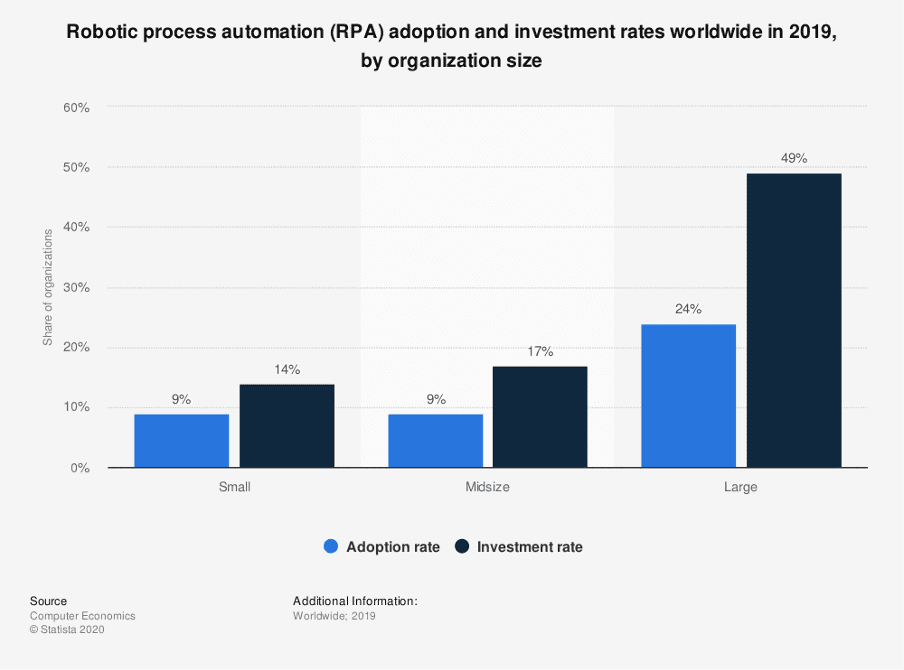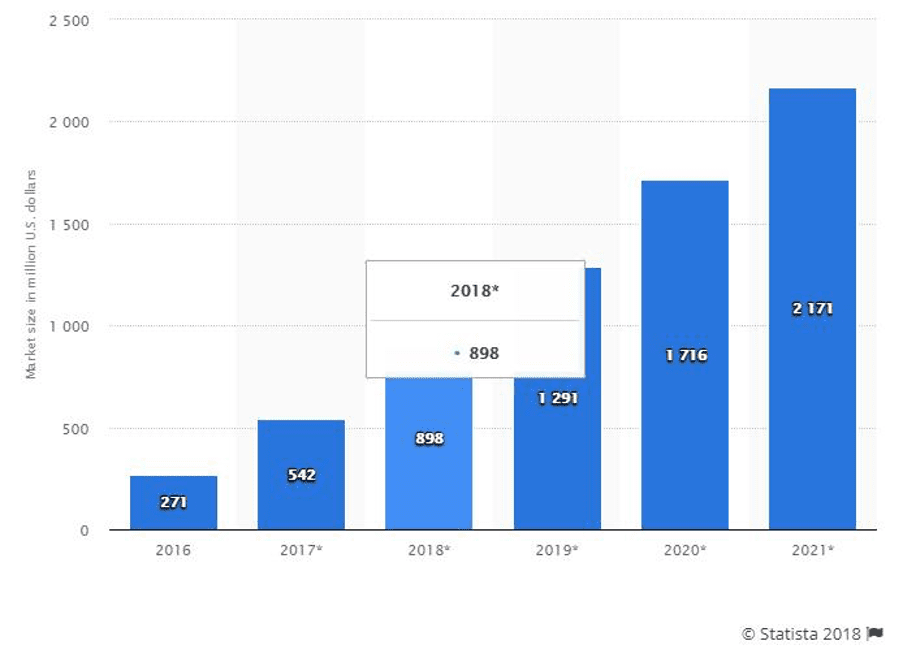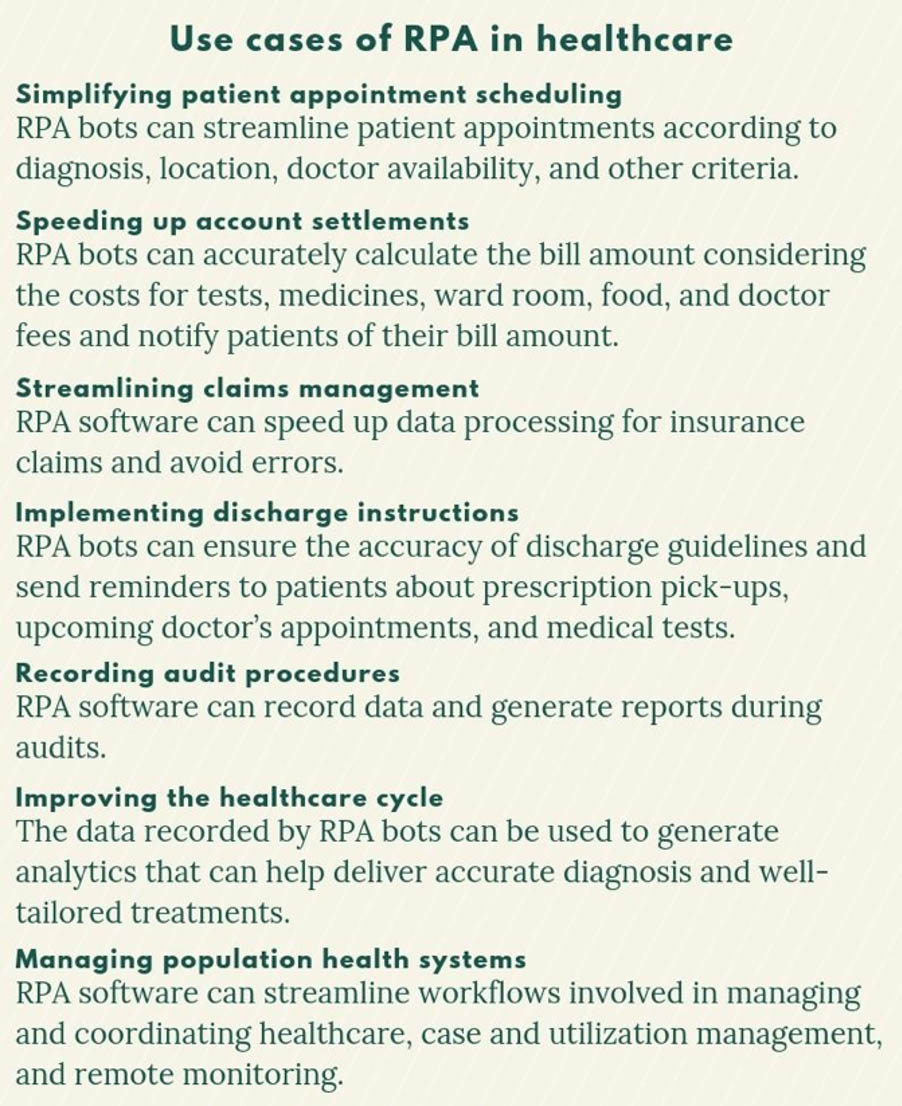
Click to learn more about author Ved Raj.
Customer demand is increasing every day for small, moderate, and large-level businesses to adopt more modern approaches.
It has been observed that organizations that are integrating advanced technologies like robotic process automation (RPA) into their back-end operations are able to increase the exponential growth of business metrics.
Last year 24 percent of large organizations and 9 percent of small- and medium-size organizations adopted RPA.

What Is RPA?
In simple terms, robotic process automation (RPA) is a productive way of operating tasks that can be organized by the use of artificial intelligence (AI).
In 2020, RPA market revenues are expected to surpass $2.9 billion worldwide. It has been estimated that if growth continues at this rate in the coming years, the market value is set to reach more than $10 billion by 2023.

Top RPA Use Cases for Different Industries
When talking about industrial growth, RPA really benefits various industries by simplifying diverse business processes. To implement this automation process in your business, it is best to hire RPA developers that will help you to understand and make effective use of this technology.
RPA Implementation in Top Growing Sectors
RPA can be helpful in various sectors. Let’s view the top growing sectors that are involving RPA in their processes (see the image below).

Let’s view how RPA can benefit different industries.
RPA Use Cases in the Healthcare Sector

There are plenty of automation precedents in the healthcare sector. Healthcare gets a lot of benefit from using the business automation process.
Let’s view how RPA is helping the healthcare industry:
- Payment Processing: In many healthcare organizations, the staff is so busy managing the patient’s payment that they’re unable to give the patient’s family and other staff the time they need. This can be avoided by involving RPA in healthcare payment departments.
- Claim Management: Claim management in the healthcare sector is generally a time-consuming process, and it involves a lot of paperwork. But this task can be easily managed by using RPA. This bot software can accurately handle claims with the help of predefined parameters.
- Patient Registration: Most healthcare companies already using RPA utilize it for managing patient registration as this process is also time-consuming. With RPA bots, this type of process only takes a matter of seconds. The software bot fills out the registration form details in very little time, which allows the staff to handle other important work.

RPA Use Cases in the Manufacturing Industry
Numerous RPA use cases exist in the manufacturing sector; this helps the manufacturing industry in carrying out error-free and simplified procedures.

Let’s view how RPA is helping the manufacturing industry:
- Strategy and Reporting: The primary benefit of using RPA in manufacturing is that it can produce accurate and detailed production reports and present a clear image of results. It expedites robust decision-making and allows for swifter responses to production obligations.
- Inventory Administration: RPA in inventory administration can be employed to automate emails, monitor inventory levels, and digitize paperwork and product lists.
- Bills for Materials: RPA software bots can generate accurate invoices, extracting error-free and trustworthy data.
- Customer Experience: When it comes to enriching client communications, RPA can be deployed to help maintain and enhance the customer experience.
RPA Use Cases in the Telecom Industry

Few robotic process automation use cases are recorded in the telecom sector, but the RPA can help this sector focus on important tasks like providing affordable, fast, and cutting-edge solutions for their clients.
Let’s view how RPA applications can help the telecom industry:
- Account Inspection: The telecom industry needs to perform user account check tasks for account users regularly. This task can be quite boring for an employee but can be automated with the help of RPA.
- Report Generation: In the telecom sector, operators are required to manually generate reports of connectivity problems and send them to officials. RPA is ideal for doing this type of reporting.
- Easy Query Forwarding: RPA bots can collect emails from users and other stakeholders and send them automatically to the concerned customer. This simplifies the task and frees up staff to do other work.
- Number Porting: One excellent RPA example in the telecom industry is customer number porting, a method that can easily be automated.
RPA Use Cases in Information Technology (IT)

Robotic process automation (RPA) in the IT sector is ideally suited to streamline development processes and increase efficiency and effectiveness.
Let’s view how RPA applications are helping the IT industry:
- Tool Installation: RPA can control the process of installing tools on the device and conserve employees working time.
- Configuration: Developers need to write codes for developing software, apps, and websites. RPA is excellent for the initial configuration and setup of the coding environment.
- Automation Testing: We all know user-testing takes time if handled manually, but this process can be enhanced through RPA, and, through this automation, bugs can also be examined and fixed more quickly than with manual testing.
RPA Use Cases in Banking and Finance

In the banking and finance sector, there are several opportunities for error, but this can be minimized by using robotic process automation (RPA). In the banking sector, RPA software is also referred to as banking software. A top software development company can help businesses in this sector build this software in a limited time frame.
Let’s view how RPA applications are helping the banking and finance sector:
- Credit Checks: RPA software bots can now operate credit checks for loan prospects and recognize whether they fall within the loan payment parameters or not. This automation process helps in reducing the loan processing time.
- Data Entry: Bankers need to fill out various forms manually, and this can be a time-waster. But doing this task with the help of RPA can save time and also minimize the probability of error.
- Review Applications: Banks like United Overseas Bank automated their working process of examining credit card applications, and this helped in increasing their speed and response time.
RPA Use Cases for the Retail Industry

Retail is a fully consumer-driven sector, and its fast-paced services have allowed this industry to gain a name in the market. Few tasks in the retail industry can’t be handled by RPA, and this automation helps businesses reduce their cost and increase efficiency.
Let’s view how RPA applications are helping the retail industry:
- Product Categorization: RPA software bots can extract SKU data to support companies in classifying products and recognizing their market shares in various regions. It helps in saving numerous hours of work.
- Product Delivery and Returns: Delivering and returning a product can include a lot of processing and customs tasks. RPA bots allow employees to check the purchase record and accelerate the entire process of delivery and returns.
- Inventory Supervision: RPA in retail inventory supervision plays a vital role. RPA bots can present data for necessary items and inform the system when there is a deficit or surplus.
RPA Use Cases in Customer Service
RPA can be utilized to improve customer relationships and deliver beneficial customer outcomes. With the help of RPA, customer service can also improve the customer experience and enhance the customer retention rate.
Let’s view how RPA applications can help the customer service sector:
- Quick Primary Responses: With the help of RPA software bots, common customer queries can be solved, and customers are offered an immediate response. In this case, for a better result, AI can be integrated.
- Query Forwarding: RPA bots can solve queries in various categories based on set parameters and also automatically send them to the corresponding departments.
- Sales Data: RPA can be employed to automate customer relationship management by presenting factual data to sales representatives. This helps in saving time and money.
- Data Categorization: RPA enables organizations to classify customers and recognize their journeys for better targeting, approaches, and services.
Conclusion
Robotic process automation (RPA) usage in various industries is increasing at a fast pace. RPA use cases show this automation is helping businesses in many different ways and ultimately enhances business productivity. In various industries, a few RPA business case criteria are considered most important. Those can be found in the image below.

If you are running a startup, SME, or large enterprise, then you can also implement RPA in your business automation process. An RPA expert can help you learn and make correct and effective use of this automation technology.
